Comprehensive Assessment: Aged Healthcare and Wellbeing Report
VerifiedAdded on 2023/03/20
|6
|1539
|51
Report
AI Summary
This report assesses the general healthcare and wellbeing of the aged, focusing on community inclusion and participation, funding mechanisms, and empowerment through various activities. The case study of Abraham, an 81-year-old resident of Lotus Compassionate Aged Care Facility, highlights the importance of these factors. The report discusses government funding for aged care services in Australia, including residential, flexible, and home care options, emphasizing the significance of Home Care Packages. It also examines the role of community inclusion, social activities, and independence-promoting tools, such as adaptive equipment and exercise, in improving the lives of the elderly. Additionally, the report addresses the importance of multiculturalism in aged care and safe work practices to minimize accidents and injuries. The conclusion emphasizes the challenges of caring for the aged, the benefits of government subsidies, and the need for continued support for care centers and cultural activities. The report highlights the importance of integrating safety measures to minimize potential hazards for the elderly.
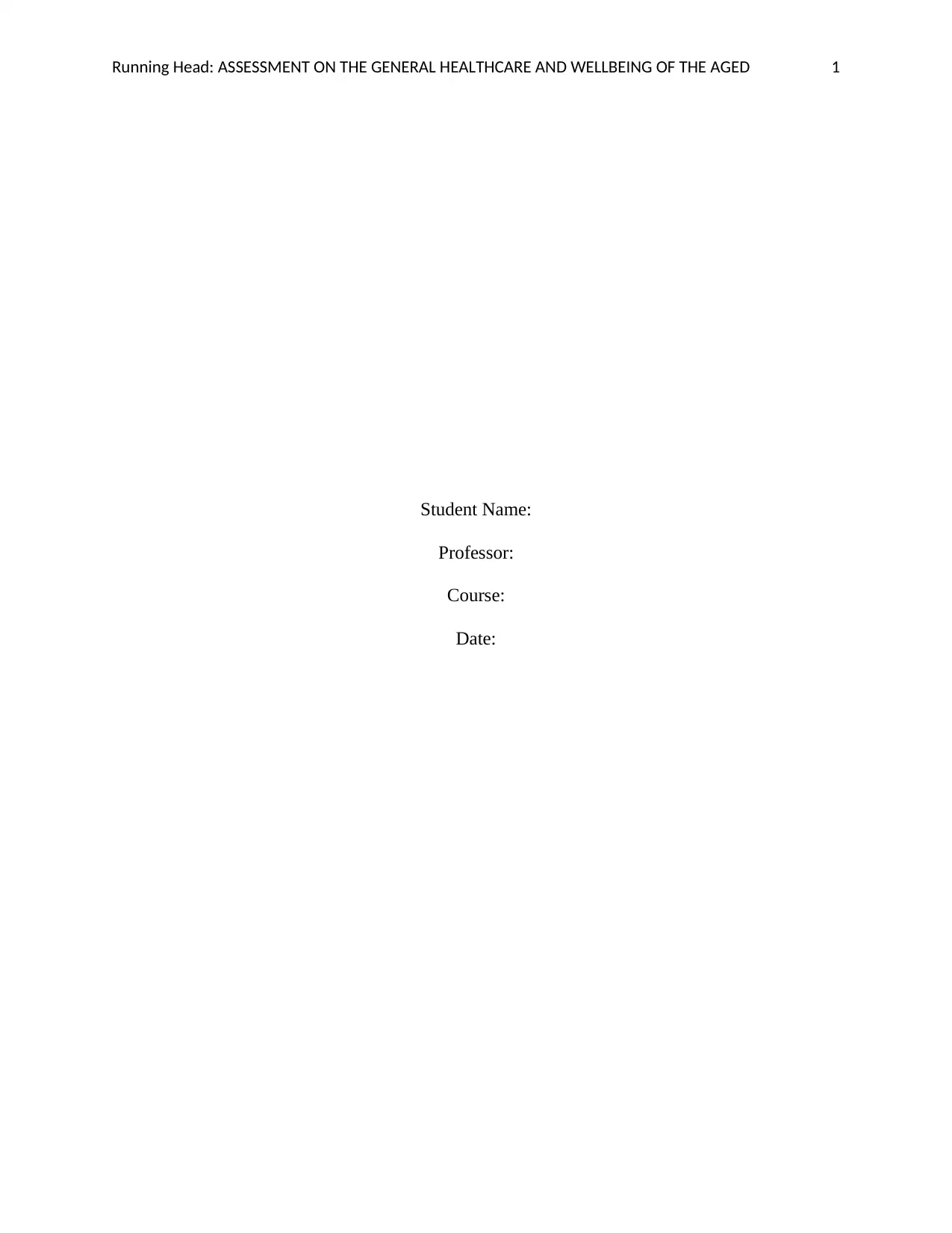
Running Head: ASSESSMENT ON THE GENERAL HEALTHCARE AND WELLBEING OF THE AGED 1
Student Name:
Professor:
Course:
Date:
Student Name:
Professor:
Course:
Date:
Paraphrase This Document
Need a fresh take? Get an instant paraphrase of this document with our AI Paraphraser
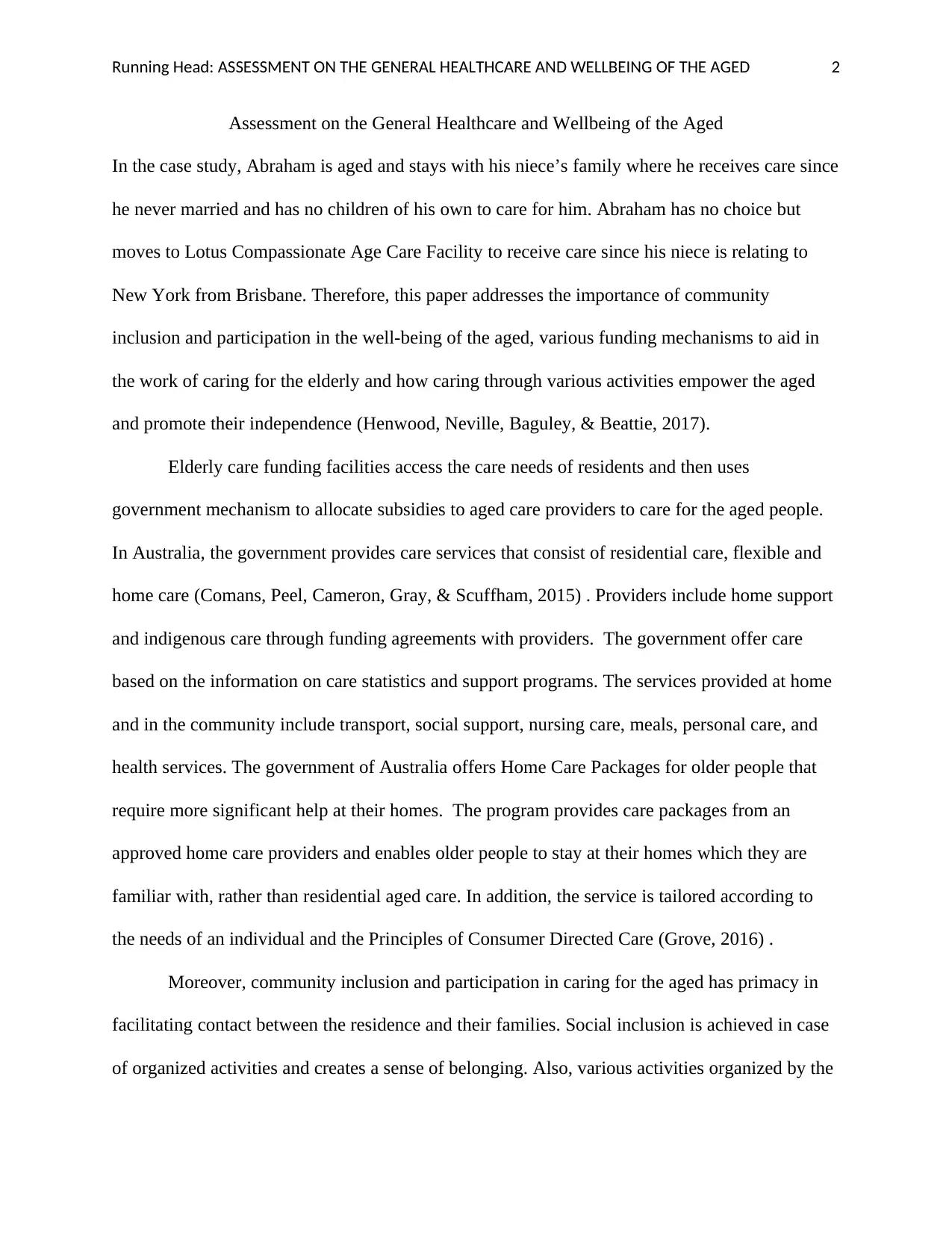
Running Head: ASSESSMENT ON THE GENERAL HEALTHCARE AND WELLBEING OF THE AGED 2
Assessment on the General Healthcare and Wellbeing of the Aged
In the case study, Abraham is aged and stays with his niece’s family where he receives care since
he never married and has no children of his own to care for him. Abraham has no choice but
moves to Lotus Compassionate Age Care Facility to receive care since his niece is relating to
New York from Brisbane. Therefore, this paper addresses the importance of community
inclusion and participation in the well-being of the aged, various funding mechanisms to aid in
the work of caring for the elderly and how caring through various activities empower the aged
and promote their independence (Henwood, Neville, Baguley, & Beattie, 2017).
Elderly care funding facilities access the care needs of residents and then uses
government mechanism to allocate subsidies to aged care providers to care for the aged people.
In Australia, the government provides care services that consist of residential care, flexible and
home care (Comans, Peel, Cameron, Gray, & Scuffham, 2015) . Providers include home support
and indigenous care through funding agreements with providers. The government offer care
based on the information on care statistics and support programs. The services provided at home
and in the community include transport, social support, nursing care, meals, personal care, and
health services. The government of Australia offers Home Care Packages for older people that
require more significant help at their homes. The program provides care packages from an
approved home care providers and enables older people to stay at their homes which they are
familiar with, rather than residential aged care. In addition, the service is tailored according to
the needs of an individual and the Principles of Consumer Directed Care (Grove, 2016) .
Moreover, community inclusion and participation in caring for the aged has primacy in
facilitating contact between the residence and their families. Social inclusion is achieved in case
of organized activities and creates a sense of belonging. Also, various activities organized by the
Assessment on the General Healthcare and Wellbeing of the Aged
In the case study, Abraham is aged and stays with his niece’s family where he receives care since
he never married and has no children of his own to care for him. Abraham has no choice but
moves to Lotus Compassionate Age Care Facility to receive care since his niece is relating to
New York from Brisbane. Therefore, this paper addresses the importance of community
inclusion and participation in the well-being of the aged, various funding mechanisms to aid in
the work of caring for the elderly and how caring through various activities empower the aged
and promote their independence (Henwood, Neville, Baguley, & Beattie, 2017).
Elderly care funding facilities access the care needs of residents and then uses
government mechanism to allocate subsidies to aged care providers to care for the aged people.
In Australia, the government provides care services that consist of residential care, flexible and
home care (Comans, Peel, Cameron, Gray, & Scuffham, 2015) . Providers include home support
and indigenous care through funding agreements with providers. The government offer care
based on the information on care statistics and support programs. The services provided at home
and in the community include transport, social support, nursing care, meals, personal care, and
health services. The government of Australia offers Home Care Packages for older people that
require more significant help at their homes. The program provides care packages from an
approved home care providers and enables older people to stay at their homes which they are
familiar with, rather than residential aged care. In addition, the service is tailored according to
the needs of an individual and the Principles of Consumer Directed Care (Grove, 2016) .
Moreover, community inclusion and participation in caring for the aged has primacy in
facilitating contact between the residence and their families. Social inclusion is achieved in case
of organized activities and creates a sense of belonging. Also, various activities organized by the
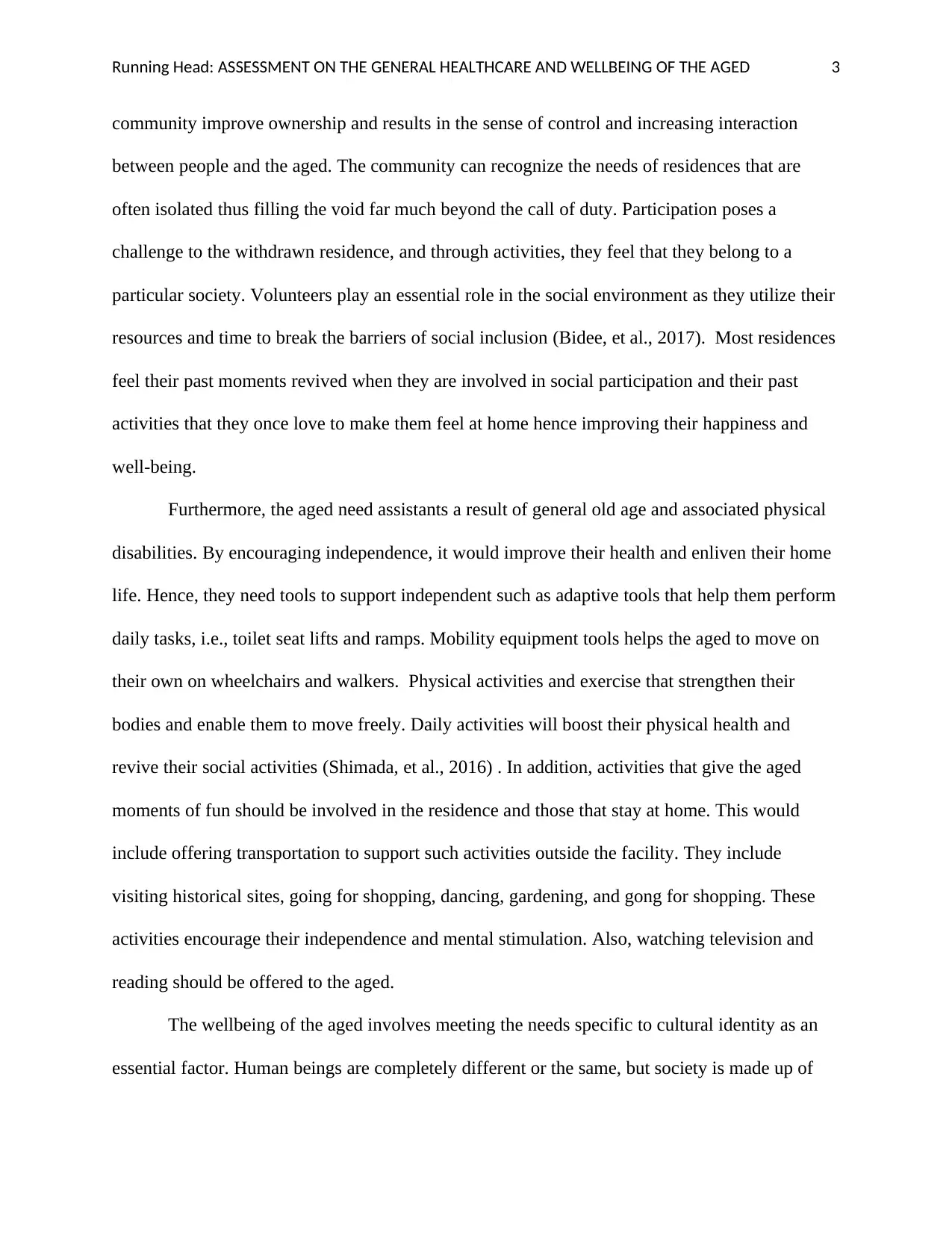
Running Head: ASSESSMENT ON THE GENERAL HEALTHCARE AND WELLBEING OF THE AGED 3
community improve ownership and results in the sense of control and increasing interaction
between people and the aged. The community can recognize the needs of residences that are
often isolated thus filling the void far much beyond the call of duty. Participation poses a
challenge to the withdrawn residence, and through activities, they feel that they belong to a
particular society. Volunteers play an essential role in the social environment as they utilize their
resources and time to break the barriers of social inclusion (Bidee, et al., 2017). Most residences
feel their past moments revived when they are involved in social participation and their past
activities that they once love to make them feel at home hence improving their happiness and
well-being.
Furthermore, the aged need assistants a result of general old age and associated physical
disabilities. By encouraging independence, it would improve their health and enliven their home
life. Hence, they need tools to support independent such as adaptive tools that help them perform
daily tasks, i.e., toilet seat lifts and ramps. Mobility equipment tools helps the aged to move on
their own on wheelchairs and walkers. Physical activities and exercise that strengthen their
bodies and enable them to move freely. Daily activities will boost their physical health and
revive their social activities (Shimada, et al., 2016) . In addition, activities that give the aged
moments of fun should be involved in the residence and those that stay at home. This would
include offering transportation to support such activities outside the facility. They include
visiting historical sites, going for shopping, dancing, gardening, and gong for shopping. These
activities encourage their independence and mental stimulation. Also, watching television and
reading should be offered to the aged.
The wellbeing of the aged involves meeting the needs specific to cultural identity as an
essential factor. Human beings are completely different or the same, but society is made up of
community improve ownership and results in the sense of control and increasing interaction
between people and the aged. The community can recognize the needs of residences that are
often isolated thus filling the void far much beyond the call of duty. Participation poses a
challenge to the withdrawn residence, and through activities, they feel that they belong to a
particular society. Volunteers play an essential role in the social environment as they utilize their
resources and time to break the barriers of social inclusion (Bidee, et al., 2017). Most residences
feel their past moments revived when they are involved in social participation and their past
activities that they once love to make them feel at home hence improving their happiness and
well-being.
Furthermore, the aged need assistants a result of general old age and associated physical
disabilities. By encouraging independence, it would improve their health and enliven their home
life. Hence, they need tools to support independent such as adaptive tools that help them perform
daily tasks, i.e., toilet seat lifts and ramps. Mobility equipment tools helps the aged to move on
their own on wheelchairs and walkers. Physical activities and exercise that strengthen their
bodies and enable them to move freely. Daily activities will boost their physical health and
revive their social activities (Shimada, et al., 2016) . In addition, activities that give the aged
moments of fun should be involved in the residence and those that stay at home. This would
include offering transportation to support such activities outside the facility. They include
visiting historical sites, going for shopping, dancing, gardening, and gong for shopping. These
activities encourage their independence and mental stimulation. Also, watching television and
reading should be offered to the aged.
The wellbeing of the aged involves meeting the needs specific to cultural identity as an
essential factor. Human beings are completely different or the same, but society is made up of
⊘ This is a preview!⊘
Do you want full access?
Subscribe today to unlock all pages.

Trusted by 1+ million students worldwide
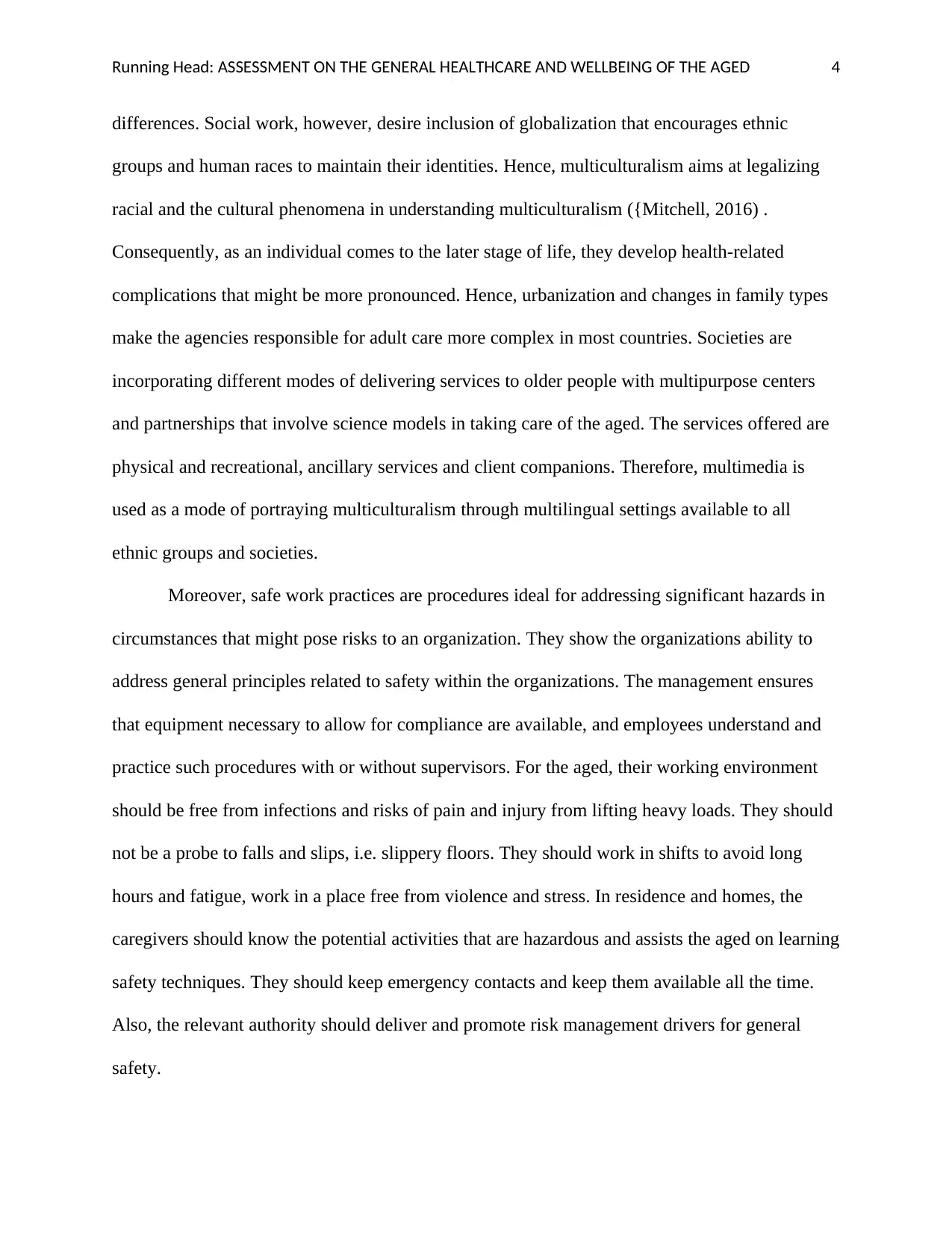
Running Head: ASSESSMENT ON THE GENERAL HEALTHCARE AND WELLBEING OF THE AGED 4
differences. Social work, however, desire inclusion of globalization that encourages ethnic
groups and human races to maintain their identities. Hence, multiculturalism aims at legalizing
racial and the cultural phenomena in understanding multiculturalism ({Mitchell, 2016) .
Consequently, as an individual comes to the later stage of life, they develop health-related
complications that might be more pronounced. Hence, urbanization and changes in family types
make the agencies responsible for adult care more complex in most countries. Societies are
incorporating different modes of delivering services to older people with multipurpose centers
and partnerships that involve science models in taking care of the aged. The services offered are
physical and recreational, ancillary services and client companions. Therefore, multimedia is
used as a mode of portraying multiculturalism through multilingual settings available to all
ethnic groups and societies.
Moreover, safe work practices are procedures ideal for addressing significant hazards in
circumstances that might pose risks to an organization. They show the organizations ability to
address general principles related to safety within the organizations. The management ensures
that equipment necessary to allow for compliance are available, and employees understand and
practice such procedures with or without supervisors. For the aged, their working environment
should be free from infections and risks of pain and injury from lifting heavy loads. They should
not be a probe to falls and slips, i.e. slippery floors. They should work in shifts to avoid long
hours and fatigue, work in a place free from violence and stress. In residence and homes, the
caregivers should know the potential activities that are hazardous and assists the aged on learning
safety techniques. They should keep emergency contacts and keep them available all the time.
Also, the relevant authority should deliver and promote risk management drivers for general
safety.
differences. Social work, however, desire inclusion of globalization that encourages ethnic
groups and human races to maintain their identities. Hence, multiculturalism aims at legalizing
racial and the cultural phenomena in understanding multiculturalism ({Mitchell, 2016) .
Consequently, as an individual comes to the later stage of life, they develop health-related
complications that might be more pronounced. Hence, urbanization and changes in family types
make the agencies responsible for adult care more complex in most countries. Societies are
incorporating different modes of delivering services to older people with multipurpose centers
and partnerships that involve science models in taking care of the aged. The services offered are
physical and recreational, ancillary services and client companions. Therefore, multimedia is
used as a mode of portraying multiculturalism through multilingual settings available to all
ethnic groups and societies.
Moreover, safe work practices are procedures ideal for addressing significant hazards in
circumstances that might pose risks to an organization. They show the organizations ability to
address general principles related to safety within the organizations. The management ensures
that equipment necessary to allow for compliance are available, and employees understand and
practice such procedures with or without supervisors. For the aged, their working environment
should be free from infections and risks of pain and injury from lifting heavy loads. They should
not be a probe to falls and slips, i.e. slippery floors. They should work in shifts to avoid long
hours and fatigue, work in a place free from violence and stress. In residence and homes, the
caregivers should know the potential activities that are hazardous and assists the aged on learning
safety techniques. They should keep emergency contacts and keep them available all the time.
Also, the relevant authority should deliver and promote risk management drivers for general
safety.
Paraphrase This Document
Need a fresh take? Get an instant paraphrase of this document with our AI Paraphraser
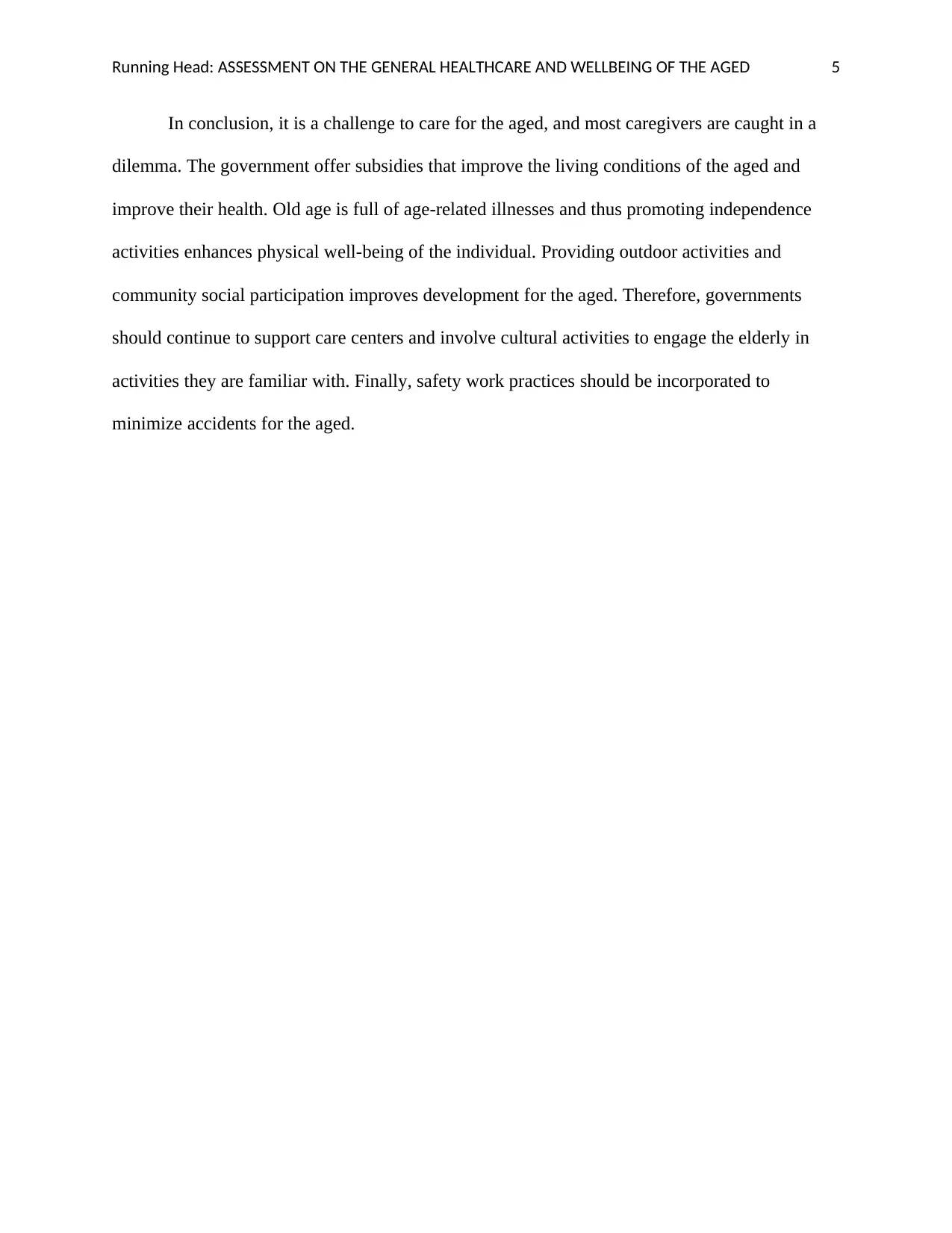
Running Head: ASSESSMENT ON THE GENERAL HEALTHCARE AND WELLBEING OF THE AGED 5
In conclusion, it is a challenge to care for the aged, and most caregivers are caught in a
dilemma. The government offer subsidies that improve the living conditions of the aged and
improve their health. Old age is full of age-related illnesses and thus promoting independence
activities enhances physical well-being of the individual. Providing outdoor activities and
community social participation improves development for the aged. Therefore, governments
should continue to support care centers and involve cultural activities to engage the elderly in
activities they are familiar with. Finally, safety work practices should be incorporated to
minimize accidents for the aged.
In conclusion, it is a challenge to care for the aged, and most caregivers are caught in a
dilemma. The government offer subsidies that improve the living conditions of the aged and
improve their health. Old age is full of age-related illnesses and thus promoting independence
activities enhances physical well-being of the individual. Providing outdoor activities and
community social participation improves development for the aged. Therefore, governments
should continue to support care centers and involve cultural activities to engage the elderly in
activities they are familiar with. Finally, safety work practices should be incorporated to
minimize accidents for the aged.
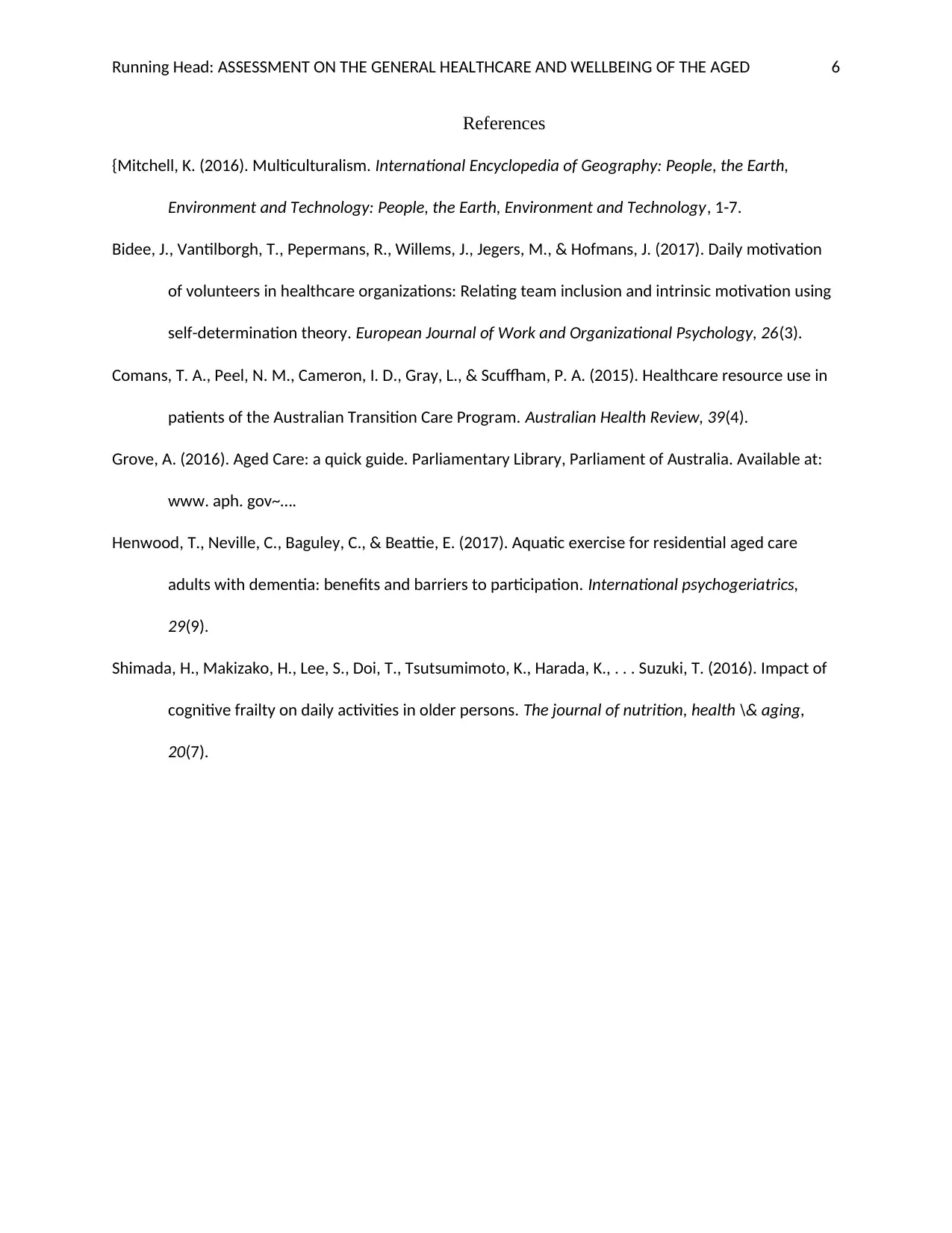
Running Head: ASSESSMENT ON THE GENERAL HEALTHCARE AND WELLBEING OF THE AGED 6
References
{Mitchell, K. (2016). Multiculturalism. International Encyclopedia of Geography: People, the Earth,
Environment and Technology: People, the Earth, Environment and Technology, 1-7.
Bidee, J., Vantilborgh, T., Pepermans, R., Willems, J., Jegers, M., & Hofmans, J. (2017). Daily motivation
of volunteers in healthcare organizations: Relating team inclusion and intrinsic motivation using
self-determination theory. European Journal of Work and Organizational Psychology, 26(3).
Comans, T. A., Peel, N. M., Cameron, I. D., Gray, L., & Scuffham, P. A. (2015). Healthcare resource use in
patients of the Australian Transition Care Program. Australian Health Review, 39(4).
Grove, A. (2016). Aged Care: a quick guide. Parliamentary Library, Parliament of Australia. Available at:
www. aph. gov~….
Henwood, T., Neville, C., Baguley, C., & Beattie, E. (2017). Aquatic exercise for residential aged care
adults with dementia: benefits and barriers to participation. International psychogeriatrics,
29(9).
Shimada, H., Makizako, H., Lee, S., Doi, T., Tsutsumimoto, K., Harada, K., . . . Suzuki, T. (2016). Impact of
cognitive frailty on daily activities in older persons. The journal of nutrition, health \& aging,
20(7).
References
{Mitchell, K. (2016). Multiculturalism. International Encyclopedia of Geography: People, the Earth,
Environment and Technology: People, the Earth, Environment and Technology, 1-7.
Bidee, J., Vantilborgh, T., Pepermans, R., Willems, J., Jegers, M., & Hofmans, J. (2017). Daily motivation
of volunteers in healthcare organizations: Relating team inclusion and intrinsic motivation using
self-determination theory. European Journal of Work and Organizational Psychology, 26(3).
Comans, T. A., Peel, N. M., Cameron, I. D., Gray, L., & Scuffham, P. A. (2015). Healthcare resource use in
patients of the Australian Transition Care Program. Australian Health Review, 39(4).
Grove, A. (2016). Aged Care: a quick guide. Parliamentary Library, Parliament of Australia. Available at:
www. aph. gov~….
Henwood, T., Neville, C., Baguley, C., & Beattie, E. (2017). Aquatic exercise for residential aged care
adults with dementia: benefits and barriers to participation. International psychogeriatrics,
29(9).
Shimada, H., Makizako, H., Lee, S., Doi, T., Tsutsumimoto, K., Harada, K., . . . Suzuki, T. (2016). Impact of
cognitive frailty on daily activities in older persons. The journal of nutrition, health \& aging,
20(7).
⊘ This is a preview!⊘
Do you want full access?
Subscribe today to unlock all pages.

Trusted by 1+ million students worldwide
1 out of 6
Related Documents
Your All-in-One AI-Powered Toolkit for Academic Success.
+13062052269
info@desklib.com
Available 24*7 on WhatsApp / Email
![[object Object]](/_next/static/media/star-bottom.7253800d.svg)
Unlock your academic potential
Copyright © 2020–2026 A2Z Services. All Rights Reserved. Developed and managed by ZUCOL.





